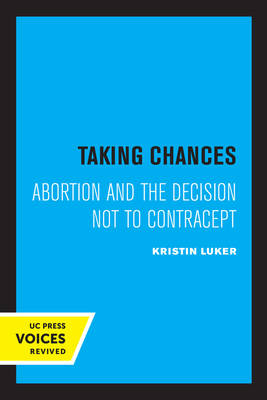
- Afhalen na 1 uur in een winkel met voorraad
- Gratis thuislevering in België vanaf € 30
- Ruim aanbod met 7 miljoen producten
- Afhalen na 1 uur in een winkel met voorraad
- Gratis thuislevering in België vanaf € 30
- Ruim aanbod met 7 miljoen producten
Zoeken
€ 67,95
+ 135 punten
Uitvoering
Omschrijving
Taking Chances: Abortion and the Decision Not to Contracept by Kristin Luker investigates the social, cultural, and personal dynamics that shape contraceptive behavior and the decision to seek abortion. Beginning with clinical encounters that challenged prevailing assumptions about who seeks abortion and why, Luker questions the "rules of plausibility" that long framed abortion as a rare, traumatic, and socially stigmatized act. Through careful sociological analysis, she demonstrates how middle-class, seemingly well-adjusted women--women who did not fit conventional stereotypes of the non-contracepting--repeatedly confronted unintended pregnancies and chose abortion as a solution. Their experiences suggest that prevailing narratives about abortion and contraception have obscured the complexity of reproductive decision-making and underestimated the interplay of values, sexuality, and social norms. At its core, the book is a study of how risk-taking in matters of sex and reproduction reflects broader cultural beliefs and institutional practices. Luker argues that assumptions embedded in family planning programs, medical practice, and social research often reflect unexamined values rather than empirical reality, subtly reinforcing gendered inequities. By reconnecting contraception to its intimate ties with sexuality and by situating abortion within the everyday calculus of women's and men's lives, Taking Chances reframes reproductive behavior as a socially constructed process rather than an individual anomaly. This work speaks to sociologists, feminists, and policymakers alike, offering a critical and nuanced account of how good intentions and accepted truths can inadvertently create oppressive realities for women navigating the politics of reproduction. This title is part of UC Press's Voices Revived program, which commemorates University of California Press's mission to seek out and cultivate the brightest minds and give them voice, reach, and impact. Drawing on a backlist dating to 1893, Voices Revived makes high-quality, peer-reviewed scholarship accessible once again using print-on-demand technology. This title was originally published in 1975.
Specificaties
Betrokkenen
- Auteur(s):
- Uitgeverij:
Inhoud
- Aantal bladzijden:
- 220
- Taal:
- Engels
Eigenschappen
- Productcode (EAN):
- 9780520310490
- Verschijningsdatum:
- 13/05/2022
- Uitvoering:
- Paperback
- Formaat:
- Trade paperback (VS)
- Afmetingen:
- 140 mm x 210 mm
- Gewicht:
- 276 g

Alleen bij Standaard Boekhandel
+ 135 punten op je klantenkaart van Standaard Boekhandel
Beoordelingen
We publiceren alleen reviews die voldoen aan de voorwaarden voor reviews. Bekijk onze voorwaarden voor reviews.







